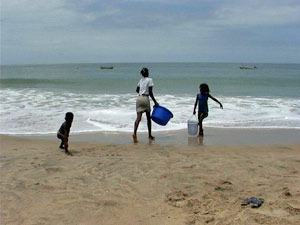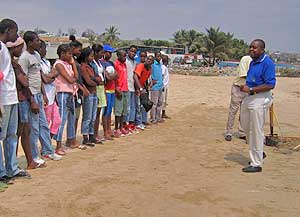|
Coastal Tourism: Educating |
| What DLIST users say… “With any programme that involves changing people’s behaviour, there are 4 steps: Communicate, Educate, Convert and Sustain. The second step is the crucial one, but also the most difficult one, as it means converting all the education messages into action that will sustain change.“ |
 Course material: “Tourism” Module 8 of the distance learning course on Sustainable Development in Coastal Areas on DLIST is dedicated to tourism. It covers aspects related to environmental and social impacts of tourism in general. Course material: “Tourism” Module 8 of the distance learning course on Sustainable Development in Coastal Areas on DLIST is dedicated to tourism. It covers aspects related to environmental and social impacts of tourism in general.
Download the course material here.
School programmes The Western Cape Department of Environment and Development Planning (DEA&DP) is using schools for environmental education via children.
For more information contact Alison Davison at adavison@pgwc.gov.za or on 021-483 2965.
Ecoclubs Recently the Museum Centre of Port Nolloth in cooperation with DLIST started an Ecoclub for children between 9 and 12 years of age. The aims of the Ecoclub are to introduce the children to the environment and to raise awareness of environmental issues. In the weekly meetings the children learn about different habitats and biodiversity of the area through little excursions, experiments, observation of animals, games, craftworks, etc. Therefore, the Ecoclub meetings are everything but ordinary school lessons.
On the longer run it will be important to communicate with other Ecoclubs in order to exchange ideas, information materials and also to organize exchange visits. If you want to share your information, experiences and ideas with the Port Nolloth Ecoclub or if you want to know more about it, please contact Nosipho isanosipho@gmail.com or Johann jlonzer@mweb.co.za.
 Marine Litter Teacher’s Manual: Class and Field Activities Based on the experience gained through the BCLME Marine Litter Project, this manual intends to provide some guidance for teachers who wish to introduce the topic in classes and plan activities with the students. It contains links to ideas and resources for both class and field activities, extracted from different sources and organisations that are dedicated to educational and awareness raising activities. This manual is not aimed at one specific age group, but the activities suggested can rather be adapted to different age groups and local circumstances. Marine Litter Teacher’s Manual: Class and Field Activities Based on the experience gained through the BCLME Marine Litter Project, this manual intends to provide some guidance for teachers who wish to introduce the topic in classes and plan activities with the students. It contains links to ideas and resources for both class and field activities, extracted from different sources and organisations that are dedicated to educational and awareness raising activities. This manual is not aimed at one specific age group, but the activities suggested can rather be adapted to different age groups and local circumstances.
You will find it in Portuguese and English in the Marine Litter Burning Issue.
Contact Maria Sardinha at bclme.behp@nexus.ao for more information about the BCLME Project
More? Send your ideas and material to admin@dlist-benguela.org
|